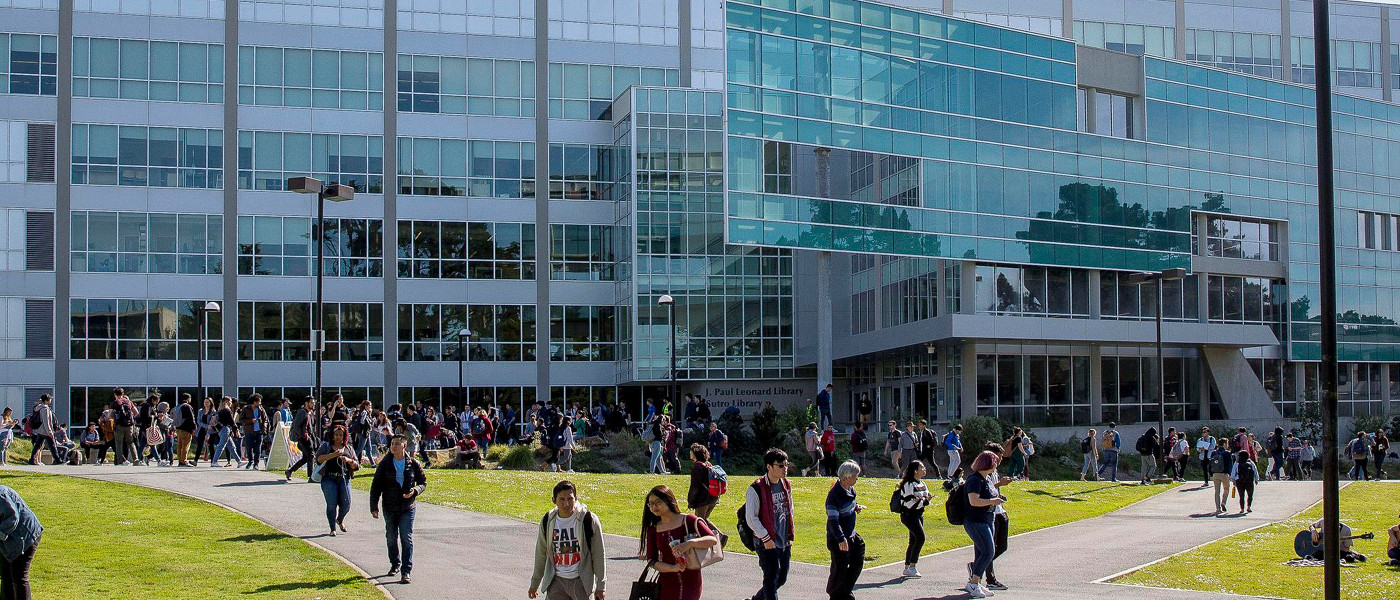

San Francisco State University
Mathematics
Study detals
: Bachelor's degree : BA (Hons) Mathematics : Full time : 36 MonthRequirements
Eligibility Requirements for Freshman from a High School Outside of the US
To be eligible for admission to SF State as a freshman, you must meet the following minimum requirements:
1. Be academically prepared for college/university
Complete a secondary/high school curriculum that totals 12 years of primary-secondary education, be qualified to enter a university in your home country and have a good scholastic record from an accredited/recognized school.
2. Meet the GPA requirement
Have a a 2.5 grade point average (GPA) in the 4.0 grading scale or B- average in academic courses completed after 9th grade.
3. Graduate from high school
You should have, or will have, the equivalent of US high school completion.
See specific secondary school credentials by country.
4. Meet the English Language Proficiency Requirement
See the English Language Proficiency section below for more information.
Eligible English Proficiency Exams
| Test | Minimum Score |
|---|---|
| TOEFL iBT Total Score | 61 |
| TOEFL iBT Special Home Edition Total Score | 61 |
| IELTS Overall Score | 6.0 |
| IELTS Indicator Overall Score | 6.0 |
| PTE Academic Score | 45 |
| SAT Evidence Based Reading and Writing | 550 |
| ACT English Score | 22 |
| IB English A – Language and Literature HL | 4 |
| IB English A – Literature HL | 4 |
| AP English Language and Composition | 3 |
| AP English Literature and Composition | 3 |
For students planning to study in F-1 student visa status, you and/or your sponsor(s) must prove that you have the financial ability to pay for school costs plus living expenses for one academic year.
You will be asked to submit the following documents:
- Financial Affidavit Form
- Proof of finances
- Passport copy (or national ID card if you do not yet have a passport)
Speciality
IMPORTANT REMINDER: Out-of-State and International students must pay $420.00 PER UNIT in addition to the tuition fees appropriate to their academic level.
Some other documents we may need for your application:
- If it has been more than 1 year since you graduated from high school, submit the Gap in Attendance Form
- If you are a US permanent resident, please submit a copy of your green card. If you have an immigration status other than F-1, you may be asked to submit additional documents to verify your status.
- If you completed any of the following exams: Advanced Placement (AP), College Level Examination Program (CLEP), International Baccalaureate (IB) Diploma - Higher Level, you may be eligible to receive additional college credit. Official exam scores will be required to award transfer credit. Visit the Standardized External Examinations page for more information.
- If you are an official partner-agent with San Francisco State University, submit the Student Consent for Release of Information form.
Pathways Available - International Year One
Additional information
Degree Overview
The Bachelor of Science in Applied Mathematics responds to the needs of business and industry for applied mathematical scientists. The program also responds to the needs of those students who enjoy mathematics for its own sake but who also have interests in other fields to which mathematics is applied. Applied mathematicians and statisticians are employed in such areas as operations research, systems analysis, computing, data analysis, biological sciences (for example, doing research on DNA topology, mathematical cancer biology, or meeting the special needs of Biostatistics), communications research, and in the management sciences.
The primary aim of applied mathematics is to elucidate scientific concepts and to describe and predict scientific phenomena through the use of mathematics. The applied mathematician is at once a mathematical specialist and a systems analyst, whose task it is to confront highly complex real-world situations with mathematical analysis. In industry, the applied mathematician has an opportunity to test both background and training in solving problems of a practical nature. It is necessary to have not only a grasp of the mathematical theories involved, but also an appreciation for the specific science or technology concerned. In this way, one can arrive at usable mathematical formulations of scientific and engineering problems.